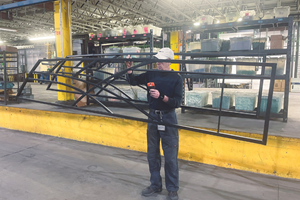Alodine EC2: ‘All aboard’ for saltwater corrosion resistance
Volvo Penta, a leading worldwide supplier of engines and complete power systems for marine and industrial use based in Chesapeake, Va., recently redesigned one of their leading engine exhaust systems and stern drives used on 20 to 35-foot pleasure craft.
Volvo Penta, a leading worldwide supplier of engines and complete power systems for marine and industrial use based in Chesapeake, Va., recently redesigned one of their leading engine exhaust systems and stern drives used on 20 to 35-foot pleasure craft.
The goal of the new Volvo Penta Ocean X was to make the equipment more durable in highly corrosive saltwater environments, and to reduce the weight of the assemblies so the boats can accelerate more rapidly, plane out faster and travel at higher top-end speeds using less fuel.
The answer was in Henkel Corporation’s Alodine EC2 coating, but first some background.
To protect the aluminum stern drive/prop assembly housings from corrosion, Volvo Penta had been applying a chromate coating for more than 30 years. But chromate contains an extremely hazardous, EPA-regulated carcinogen, and requires a complex on-site water treatment facility at Volvo Penta.
The redesign presented two dilemmas: how to better protect the stern drive assembly from corrosion, and how to eliminate the dangerous, expensive and environmentally hazardous chromate coating process.
Then came the issue of the manifold redesign. In January, the EPA introduced new emissions regulations requiring catalytic converters to improve exhaust emissions. Anticipating this deadline, Volvo Penta began to redesign their exhaust manifold in 2008 to meet the pending federal requirements. But the addition of a catalytic converter would not only add to the overall size of the engine exhaust system, it would also greatly increase its weight.
The manifold exhaust stream gets as hot as 850ºC. The exhaust gases must pass through aluminum and rubber components before entering the body of water. To ensure that these components do not melt from exposure to these super-heated gases, seawater passes over the manifold, cooling the exhaust. As this seawater is highly corrosive, few substrate materials will withstand ongoing exposure.
Volvo Penta’s existing exhaust system was made of heavy cast iron that was painted for optimum corrosion resistance. To reduce the weight of the newly-designed, larger engine exhaust system, Volvo Penta engineers wanted to use a lighter substrate material such as aluminum, but were challenged to find a material that could withstand the corrosive seawater and temperature extremes.
Representatives from Volvo Penta attended an industry conference where a Henkel scientist was presenting technical information on the company’s new Alodine EC2 electroceramic coating technology. Designed to work on most light metal surfaces, Alodine EC2 forms a protective layer of titanium dioxide ceramic that resists corrosion, increases wear resistance and reduces surface friction on the finished coated surface.
“Henkel’s Alodine EC2 product is an environmentally safe, less complicated coating process that eliminates the need for hazardous chrome wastewater treatment,” says Pat Scalera, surface treatment technology manager at Henkel. “This coating technology allowed Volvo Penta engineers to substitute aluminum as the substrate of choice for the manifold redesign, and coated with Alodine EC2, this lighter substrate performed at levels exceeding all expectations.”
As aluminum is much less dense than cast iron, Volvo Penta greatly reduced the weight of the exhaust manifold, improving both fuel economy and overall performance.
As electroceramic coating technology is compatible with most typical paint finishes such as e-coat, powder and liquid paint systems, this coating process easily accepted the paints used to make the Ocean X stern drive and engine exhaust system more aesthetically pleasing.
Scalera says Alodine EC2 coating is formed through the electro deposition of titanium oxides, providing a tough, flexible coating with exceptional chemical, corrosion, temperature and abrasion resistance. Compared to traditional coating methods, the Alodine EC2 coating process requires fewer steps, allowing for faster process speeds and reduced processing costs, he says.
“Alodine EC2 eliminates pretreatment and typically eliminates the need for up to 1-2 layers of paint, all in one quick step,” he says. “The coating’s environmental resistance properties, combined with its simplified coating process, provide options for automotive, marine and industrial applications that are not available with any other coating process.”
Aluminum components coated with EC2 have now been used at Volvo Penta for approximately two years With the Alodine EC2 coating, corrosion resistance is dramatically improved when compared to chromate coated parts. During testing, electroceramic coated parts were scratched and then subjected to salt water immersion and tidal testing. With EC2, scratched surfaces easily resisted corrosion damage creep, the deepening and widening of the damaged area.
In October of 2009, Volvo Penta was awarded the IBEX Innovation Award for the new Ocean X stern drive design.
For more information on Henkel’s Alodine EC2 coating, call 1-866-332-7024, or visit www.henkelEC2.com.
Learn More
Keeping Engines Shipshape
To read about how the marine industry deals with high-performance aluminum plating technology, visit http://www.pfonline.com/articles/049905.html
Related Content
Women in Finishing Forum Tours Regal Boats
This month’s Photo Finish features a finishing process on a Regal boat.
Read MorePowder Coating Overcomes Post Forming
Six Sigma methodology, open communication, and collaboration produce results for leading boat manufacturer.
Read MoreRead Next
A ‘Clean’ Agenda Offers Unique Presentations in Chicago
The 2024 Parts Cleaning Conference, co-located with the International Manufacturing Technology Show, includes presentations by several speakers who are new to the conference and topics that have not been covered in past editions of this event.
Read MoreEpisode 45: An Interview with Chandler Mancuso, MacDermid Envio Solutions
Chandler Mancuso, technical director with MacDermid Envio discusses updating your wastewater treatment system and implementing materials recycling solutions to increase efficiencies, control costs and reduce environmental impact.
Read MoreEducation Bringing Cleaning to Machining
Debuting new speakers and cleaning technology content during this half-day workshop co-located with IMTS 2024.
Read More



















